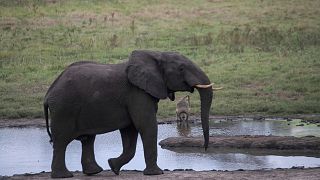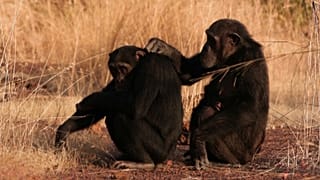Senegal
Caught on camera.
This lone elephant was filmed by a camera trap in Niokolo-Koba National Park last year.
Senegal’s elephant population has been reduced to just a handful due to decades of poaching, deforestation, and habitat encroachment.
So this rare sighting in a remote area has brought hope to conservationists.
Senegal has one of the most threatened elephant populations in Africa, with the population in the Niokolo-Koba park diminishing from 450 in the late 1970s to between 5 and 10 currently, according to the Elephant Crisis Fund.
"We have conducted extensive surveys in the park since 2021 now, covering the entire park with camera traps. And so far we only have evidence of one single elephant," says Philipp Henschel, a wildlife conservationist and Regional Director, West and Central Africa, with Panthera.
"But there have been rumours, most recently from a truck driver crossing the park, there's a national highway bisecting it, and this truck driver said he saw three elephants and he's sure that that was elephants and so there is a little hope that we have a tiny group of elephants left in the park."
Conservation groups say the sighting reinforces the need to strengthen anti-poaching patrols, restore habitats, and work closely with nearby communities to reduce human-elephant conflict.
The park is known for its unique biodiversity and ecosystems, which led to its inclusion on the UNESCO World Heritage Site list.
But wildlife depletion, poaching and mining meant it was put on UNESCO's danger list from 2007 to 2024.
Steps to tackle the problems, including monitoring wildlife, combating poaching and illegal gold panning, and a mine pollution control system mean the park is no longer considered to be in danger.
And elephants have a role to play in keeping the habitat healthy.
"It's important for the park, also for the park ecology because they're such an important species to have. They push down trees, that can bring in growth of grasses, the grasses are important for herbivores grazers like the buffalo and other antelope, those in turn are important for the lions that we're trying to protect," says Henschel.
"So, the elephant is what we call the keystone species. So, for the park it would be an advantage to bring them back, but it also needs to be acceptable for the local population living around the park and so this is, I think, the big question that we need to answer."
The African savanna elephant is currently listed as endangered on the IUCN Red List, with populations across West Africa facing steep declines due to illegal hunting and shrinking natural habitats.











Go to video
Kenyans protest after roaming elephants kill 4 people in a week
02:10
Ears 'notched' in drive to boost Kenya's Rhino population
01:49
Elephants' calm response to drones opens new doors for observation - Study
00:53
Lagos Fashion Week wins category at annual Earthshot awards ceremony
01:02
Cotswold park welcomes Markus, a rare white rhino calf
01:00
Elephants at Oregon Zoo crush giant pumpkins to celebrate Halloween